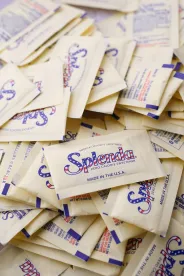Splenda Pans Scientist’s Cancer Claims As ‘Fearmongering’
Sucralose is approved by FDA for use in food as a sweetener. A May 29, 2023 published research paper, Toxicological and pharmacokinetic properties of sucralose-6-acetate and its parent sucralose: in vitro screening assays, however, reports on potentially concerning toxicological and pharmacokinetic properties of sucralose-6-acetate (S6A), which the paper describes as an intermediate and impurity in the manufacture of sucralose. The study authors conclude that S6A is genotoxic, finding that it effectively broke up DNA in exposed cells. Further, the paper reports that recent commercial sucralose samples were found to contain up to 0.67% S6A and also discusses studies in a rodent model that the authors interpret as suggesting that S6A may also be produced by acetylation of sucralose in the intestines.
On August 8, 2023, a defamation lawsuit was filed against Dr. Susan Schiffman, the SA6 study’s lead author, in the Middle District of North Carolina by TC Heartland LLC, the producer of a sucralose product sold as Splenda, over Dr. Schiffman’s comments in a May 31, 2023 press release by NC State, where Dr. Schiffman is an adjunct professor, and in a May 31, 2023 appearance by the professor on WRAL News at 4 pm. Heartland’s complaint attacks the May 29, 2023 paper as “dishonest and deeply flawed,” specifically disputing that there is any basis for claiming that sucralose is metabolized to S6A in the human gut. As to potential impurities in sucralose, the complaint further contends that Dr. Schiffman falsely told the press that Splenda, which Heartland maintains does not contain detectable levels of S6A, contains a “genotoxic” substance that “broke up DNA” and “can cause inflammation and even cancer”—and that Splenda contains enough of this substance to “exceed . . . the threshold of toxicological concern,” despite the paper expressly confirming that the sucralose involved in the study was not the sucralose used in Splenda.
The merits of the case will be determined going forward. We note that while FDA’s review of sucralose covers numerous safety studies on the substance and its hydrolysis products, there is no discussion of S6A as a possible impurity in sucralose or evidence for the safety of any level of potential dietary exposure to SA6.



 />i
/>i

